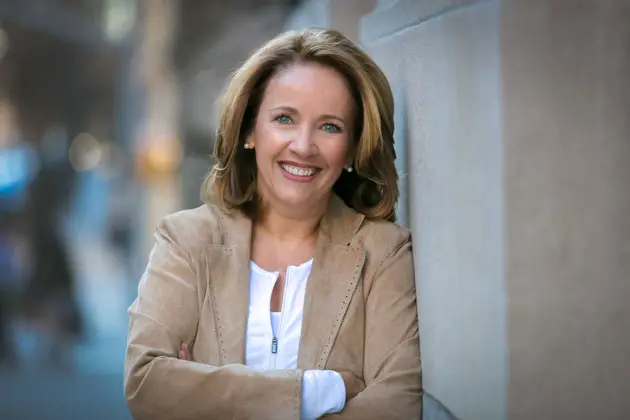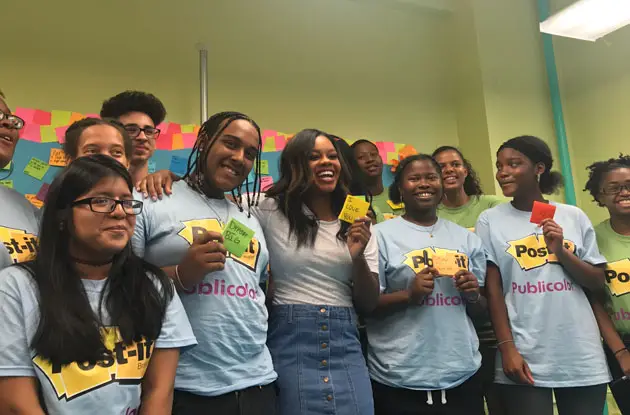Author Mary Lou Quinlan answers questions regarding her book, “The God Box.” The book touches on family stories, personal history and healing through the physical act of acceptance and letting go with a God Box, a object very close to Quinlan’s heart. Mary Lou Quinlan’s “The God Box” goes beyond popular book club reads by focusing on love, faith and family.
Mary Lou Quinlan: This is the favorite project I’ve ever worked on and I feel terrible saying this, but if I died tomorrow I would say I was so happy I did this. It’s just a joy telling my mom’s story and best of all, people read it and say, “Oh, Mary is just like my mom. And I think ‘Oh my gosh, you’re talking about MY mom.’ I just love that and that’s my story – I’m here, just all daughter, all daughter all the time.
Question: When I first heard of the book, originally, I didn’t want to read it because I am not a religious person at all and when I saw The God Box, it was not something I would normally pick up but then when I read about your story, I thought this was my life. Other than the God Box part, the whole part about losing your father and your mother, I even have one brother – and the ages are so similar – I found when I was reading it I was able to keep the religion part out of it because the story could have been her hopes and dreams for you really. To me I could look it as putting in those things as putting in those things for you. I want to start doing it myself – not necessarily a God Box but I love the idea of writing something down for my family – I still believe in the power of people – the more people you have on your side – so to me – the book still makes so much sense.
Mary Lou Quinlan: You picked up on two messages, particularly this idea of a legacy to children. My mom died of a stroke that just wiped her out and we didn’t have time to talk. And yet what she left behind – all those notes of love, it was just like getting her. You could tell she was tuned into every little hiccup of our lives. When you see it written down, it’s just such an affirmation of that love. So if you take away that for your children, it is so cool. And the other idea is asking for help. Some are very good at it, some are better than others. I have never been that good at it. And I think that the nature of admitting that we need help is very powerful too.
Question: The most powerful lessons I found in the book was the power of your mom letting things go. Your mom was able to write it down put it in the box and let it go. How did she do that?
Mary Lou Quinlan: We do hold on and think that we can do everything. We just mull and mull and chew and chew and stay up all night, your head is rolling with a million things. And I’m not saying my mom was perfect and she never worried, but certainly some things she asked for again and again. In the case of her illness, it wasn’t like she had this cancer and it was over and out. As she experienced new levels of it she would ask again. It wasn’t about giving up. It wasn’t really a persistence but she did learn to let go. That’s why when we would keep nagging about whatever we were complaining about, she would say you really have to stop thinking you can fix this. She had this belief that it will be handled as it should be. She was amazing. She was a working mom in every way and a great wife to my dad, mother to us and just did her thing, day by day.
Question: Did you find it cathartic writing the book or did you find it difficult going back to those parts of your life?
Mary Lou Quinlan: It continues to be cathartic because I guess the play makes it never over. I found that when I’ve written business books before, it’s so easy to be arm’s length from a subject and be all smarty pants but when you’re writing about your mother… it had to be the best I could ever do. That’s why I kept thinking the book had to be good for her. That makes you think deeply about what was the truth and what did I feel. And it’s very cathartic, particularly about my dad because he died more recently. If you have experienced this and I’m not saying things get better with time but it does help, with my Dad’s memory being so fresh when I write about him, I can say that was the harder part. I could still see him. And I also took care of him for six weeks in hospice which was different than my mom’s situation so the death part of it was so palpable to me and writing about it was probably the hardest part. But I knew he wanted me to do it. When I first told him I was going to be doing it, I didn’t know at the time that he was going to die.
Question: How is the show changing when you perform it?
Mary Lou Quinlan: The process of writing and developing a play is very iterative. For instance, I just had four hours of rehearsal. What happens is that is as you’re developing a story, Martha Wollner who is the co-developer and director will say, wait a minute, take yourself back. For instance, when my dad dying. When I went to his house and he was sleeping in his bed and she said, ‘tell me what you’re seeing.’And so each time I take myself back and I’m seeing how he looks and that his hearing was bad. So the play becomes more specific, it becomes funnier and in some ways sadder. But what I hope is that as the play is developing, it brings me closer to the audience. I feel that it’s becoming more interactive even though the audience isn’t speaking but they are connecting more with it.
Question: Are you setting up these things or is the publisher setting up? What are the logistics of the speaking engagements?
Mary Lou Quinlan: Because I’ve done it before I started with a blank slate and I grew my list – who do I know or what conferences are happening. I remember sketching out a book tour and it had a little bit of this, a little bit of that. The Pittsburgh one connected me to two events. I told another woman and she said, I’m associated with Chatham College Then we called Barnes and Noble and they said let’s do a book signing. So bit by bit, they are building out. And it’s very hand made, that’s what I would say. The harder part is after the book is completed – we have huge social media activity, an app, a documentary film. Thanks to my father and the small but meaningful money he left me, I decided to spend it on honoring them and that’s what I’m doing.and the proceeds will go to cancer organizations since that is the disease that took their lives.
Question: Tell us about The God Box App you’re developing.
Mary Lou Quinlan: We hope the app will be ready in May and it will be free for the iPhone. It’s very simple and you can choose your little note paper – just like my mom had different papers. It says Dear — you fill in the blank and you have your message, sign it and then there’s animation as it goes in the box. My mom always told people that you were in my God Box and now everyone can do it. I keep running alongside this ice cream truck of possibilities. I can’t believe it’s next week. I better go buy some Spanx or something! It’s all happening like it or not. The clock has ticked.
Question: How is your family involved in the launch of the book?
Mary Lou Quinlan: I have a ton of family and nieces and nephews and my brother. For me and my brother it’s a wonderful experience to share this together. My nephews are putting alerts out to their network. I feel like I have a big family hug around this book.
Question: Did you share the same compassion for faith?
Mary Lou Quinlan: First of all, I was aware of my mother’s faith from the get go and I knew how deeply she believed. It wasn’t like I went from zero to 100 when I saw the God Box. It was the casual, open way she talked with God – that was an eye opener. The compassionate part – my mother was overwhelming to me in her heartfelt beliefs. I was relying on her to do the heavy lifting instead of me working through my own faith and beliefs. I find I am offering prayers more often. I have a long way to go to catch up to her.
Question: What was the inspiration behind the book?
Mary Lou Quinlan: If it hadn’t been for The God Box, I don’t think there would have been a book. I would start to tell the story in an anecdotal way, the more I realized there was something there even if it’s in a storytelling form. When I first wrote about it in Real Simple, I was amazed at how many people connected with the story and I knew from that experience that I wanted to turn it into a book.
Question: How are you utilizing social media to spread the word about The God Box?
Mary Lou Quinlan: Before this book, I had never tweeted a thing. I nagged about it and said I’m better in person. At first, I whined about having to use Twitter. Now I’ve got my Hootsuite and I’m sitting in front of the TV – it’s not that I didn’t know social media. It’s just such a surprise that I like it and I now know how meaningful it can be. I guess if you think about it, my mom was tweeting God – she really wrote these short messages straight from the heart. She would scribble around the corners, around the back – she would have multiple messages on piece of paper. When she wrote about my brother she used the same piece of paper and the same color ink and if something else went wrong, she’d scribble another note with same pen on that sheet of paper. It was amazing – she was a secretary back in the 50’s like the Mad Men. She took shorthand so I would sometimes need to find someone to decipher them.
Question: Did your mom want to be a writer?
Mary Lou Quinlan: She was a writer in her own way. And she wrote and self-published her own story. At the time she was in her 70s and she was the only woman in the retirement camp (which I called it) who used a computer. The computer room was all men and her. And we got her a Mac in the early 90’s and she did the whole book herself, she laid it out. And she was a very good writer, a clear honest kind of writer, not contrived at all. And when I look at all the things she wrote beautiful notes, the cards and letters that she wrote to my dad, the very beautiful book that she did, she was a writer.
Question: Where is the play running?
Mary Lou Quinlan: It doesn’t run in the traditional sense. I’ll be doing it on the road in five different venues. I’ve set up different events – the proceeds of the book are going largely to cancer causes. It’s really interweaving what works for the various audiences I’m performing it at a synagogue, at a hospice. For the next three weeks I’m at a different place every day. I’m doing a half hour version as part of the book tour vs. the theater crowd. What I’ve identified are the most important themes. The thing that I have heard when I talk about my mom, people say “but I hate my mom, I can’t believe you never had a fight,” I’m not going to make up a conflict. The conflict is more in me grappling with my ongoing relationship with letting go and having the courage to admit that something is wrong.
To read NYMP Editorial Director Dawn Roode’s take on The God Box, head over to the NYMP blog.




















